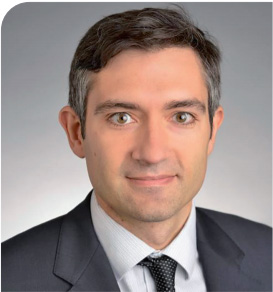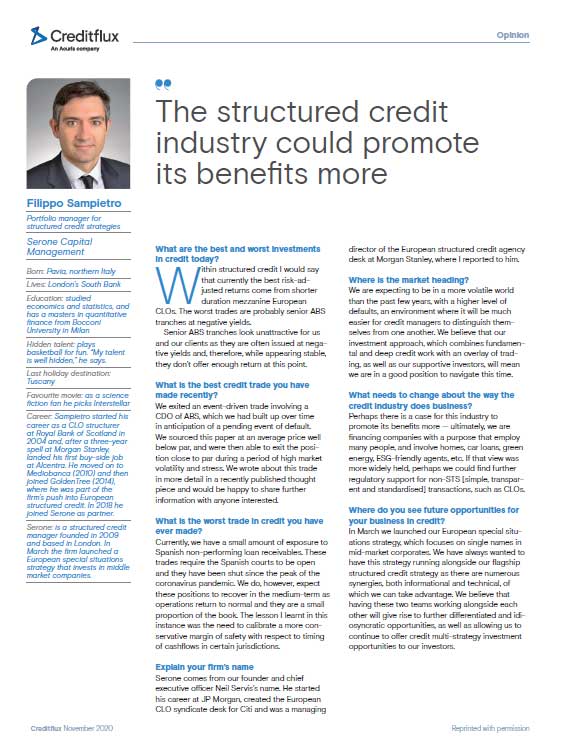Filippo Sampietro, Portfolio Manager within Serone’s Structured Credit team recently had the pleasure of being interviewed by Creditflux
The structured credit industry could promote its benefits more

What are the best and worst investments in credit today?
Within structured credit I would say that currently the best risk-adjusted returns come from shorter duration mezzanine European CLOs. The worst trades are probably senior ABS tranches at negative yields.
Senior ABS tranches look unattractive for us and our clients as they are often issued at negative yields and, therefore, while appearing stable, they don’t offer enough return at this point.
What is the best credit trade you have made recently?
We exited an event-driven trade involving a CDO of ABS, which we had built up over time in anticipation of a pending event of default. We sourced this paper at an average price well below par, and were then able to exit the position close to par during a period of high market volatility and stress. We wrote about this trade in more detail in a recently published thought piece and would be happy to share further information with anyone interested.
What is the worst trade in credit you have ever made?
Currently, we have a small amount of exposure to Spanish non-performing loan receivables. These trades require the Spanish courts to be open and they have been shut since the peak of the coronavirus pandemic. We do, however, expect these positions to recover in the medium-term as operations return to normal and they are a small proportion of the book. The lesson I learnt in this instance was the need to calibrate a more conservative margin of safety with respect to timing of cashflows in certain jurisdictions.
Explain your firm’s name
Serone comes from our founder and chief executive officer Neil Servis’s name. He started his career at JP Morgan, created the European CLO syndicate desk for Citi and was a managing director of the European structured credit agency desk at Morgan Stanley, where I reported to him.
Where is the market heading?
We are expecting to be in a more volatile world than the past few years, with a higher level of defaults, an environment where it will be much easier for credit managers to distinguish themselves from one another. We believe that our investment approach, which combines fundamental and deep credit work with an overlay of trading, as well as our supportive investors, will mean we are in a good position to navigate this time.
What needs to change about the way the credit industry does business?
Perhaps there is a case for this industry to promote its benefits more – ultimately, we are financing companies with a purpose that employ many people, and involve homes, car loans, green energy, ESG-friendly agents, etc. If that view was more widely held, perhaps we could find further regulatory support for non-STS [simple, transparent and standardised] transactions, such as CLOs.
Where do you see future opportunities for your business in credit?
In March we launched our European special situations strategy, which focuses on single names in mid-market corporates. We have always wanted to have this strategy running alongside our flagship structured credit strategy as there are numerous synergies, both informational and technical, of which we can take advantage. We believe that having these two teams working alongside each other will give rise to further differentiated and idiosyncratic opportunities, as well as allowing us to continue to offer credit multi-strategy investment opportunities to our investors.
Published
20 November 2020


